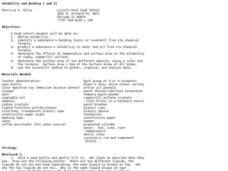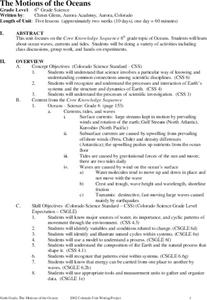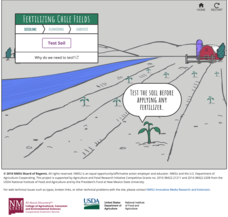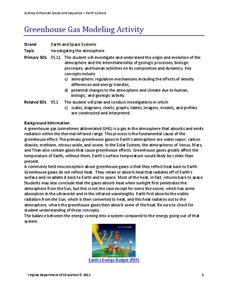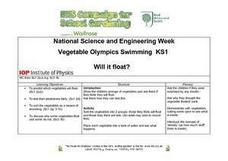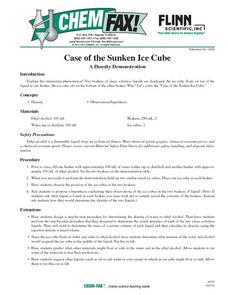Curated OER
Plastic Identification Lab
In this plastics worksheet, students experiment with an unknown plastic and determine the polymer name and resin code by using a flow chart of various tests. They answer five questions after they collect their data.
Curated OER
Gel Electrophoresis
Students conduct a variety of experiments to explore gel electrophoresis. In this biology instructional activity, explain how this process separate DNA and RNA. They discuss the practical applications of this method.
Curated OER
Weather, Sea Level Rise and Climate Change Course
Students explain the impact of glacial melting to global climate change. In this environmental science lesson, students design an experiment to investigate the effect of salinity change to melting glaciers. They share their results to...
Curated OER
The Solar System
Third graders investigate Newton's law of Motion. In this chemical reaction lesson, 3rd graders participate in an experiment with rockets to study Newton's law. Students observe the effects of a chemical reaction made by combining...
Curated OER
The Motions of the Oceans
Students examine the topics of ocean waves, currents, and tides. They locate and label ocean currents on a world map, conduct experiments, analyze key vocabulary, view demonstrations and record the data, and complete handouts.
Curated OER
What is an Estuary?
Students define the terms estuary and watershed. They conduct an experiment to determine the density differences between fresh and saltwater. They examine the salinity distribution of the Peconic Bay Estuary.
Learning Games Lab
Fertilizing Chile
Fertilizer can mean the difference between a profit and a loss. Scholars use an online interactive to explore the effects of fertilizing in agriculture. Given information about the nitrogen levels in the soil, they decide the fertilizer...
Virginia Department of Education
Greenhouse Gas Modeling Activity
Why are greenhouse gases called greenhouse gases? Young Earth scientists learn about greenhouse gases though experimentation in the second installment of a 3-part series. They use lamps to model radiant energy as well as warming through...
Curated OER
Vegetable Olympic Swimming: Will it Float?
Learners inspect nutrition by conducting a science experiment in class. In this vegetable identification lesson plan, students examine a group of different veggies and predict whether they will sink or float in a tub of water. Learners...
Curated OER
Volumw Measurement, English System
Eighth graders biew each volume container and discuss where they have seen them in their home, and how they have seen them used. They explore the different names of volume sizes and their equivalents towards one another. Students...
Curated OER
Clay Boats
Seventh graders are given the opportunity to use model-building as a way to help comprehend the forces and phenomena at work in the world around them. They use both successful and unsuccessful models to make inferences, refine...
Curated OER
Chemistry: The Case of the Sunken Ice Cube
Young scholars examine a density demonstration involving ice cubes and beakers of water and alcohol. After observing how one ice cube floats in water and sinks in alcohol, they determine which mixture of the two would suspend the ice...
Curated OER
Float Your Boat
Students investigate buoyancy, displacement and density. In this flotation lesson students study the Archimedes' Principle, analyze data and draw conclusions.
Curated OER
Locating Vent Fields Using CTD Data
Students describe the way hydrothermal vents work. Students work on locating vent regions through remote collection of data about water temperature and density. Comparing density and temperatures graphs, students search for indicators...
Curated OER
Stomata
Students explore what the stoma does for a plant. In this botany lesson students complete a stomatal peel experiment and measure its densities.
Curated OER
Effects of the Southern Pacific Railroad Causeway
Fifth graders describe the appearance of a substance before and after a physical change. They re-create the Southern Pacific Railroad Causeway across the Great Salt Lake. They determine for themselves how the water is exchanged...
Curated OER
Get to know H2O!
Students investigate scientific concepts and inquire about physical states of matter. The transition of water is considered and is easy to facilitate because of its abundance and often observed physical changes.
Curated OER
Investigating Convection Currents
Students examine how differences in the temperature and salinity of the water help create ocean currents. They perform an experiment which shows how temperature affects the circulation of ocean water.
Curated OER
Cody's Science Education Zone
Students observe a scientific experiment and pose a hypothesis. For this scientific inquiry lesson, students make predictions about the combination of alcohol in water and how it will affect a floating ice cube.
Curated OER
HOW FAST DO SEDIMENT GRAINS OF DIFFERENT SIZES SETTLE?
Students conduct an experiment using sand, a jar, and a paper clip to analyze the effects of different kinds of sand vis a vis its sediment. They graph their findings and analyze for factors of size, shape, and density.
Curated OER
Earth Science: The Structure of the Earth
Students identify and complete activities about the structure of the Earth. For this Earth structure lesson, students view a Powerpoint about the Earth's layers and complete a diagram. students compare temperatures in the Earth's layers...
Curated OER
Changing Your View
In this refraction worksheet, students will explore the property of light called refraction. Students will conduct a quick experiment to understand how light is refracted. Then students will complete 2 short answer questions.
Curated OER
Air: Demonstrating Its Presence and Effects
Young scholars explore the concept of air. In this gravity lesson, students perform various experiments that deal with gravity, air resistance, and air pressure.




